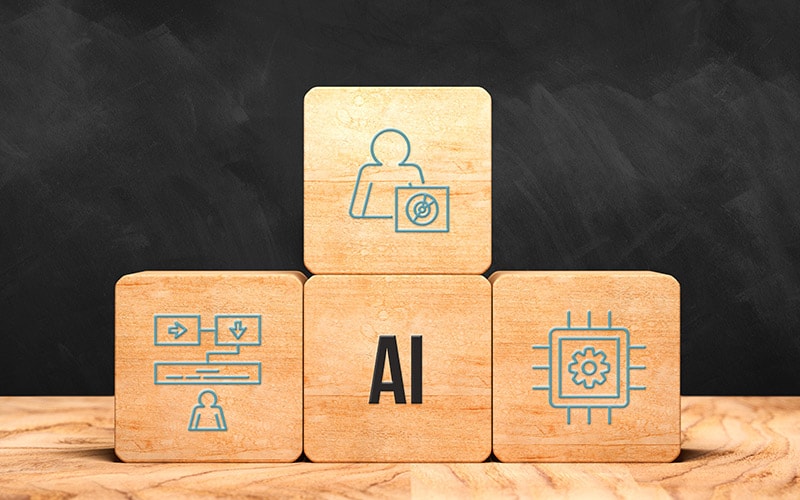Perspectives
Our views on business technology trends
Article
Beyond augmentation: Agentic AI for software development
AI is progressively used in software development. But simple augmentation doesn’t achieve the full benefit of generative AI-based technology. For this, agentic AI must be used.
-
Article
Creating the live enterprise: The agentic AI imperative in manufacturing and retail
Agentic AI’s piecemeal adoption in manufacturing and retail creates local optimization but encourages value leakage overall. To create sustainable value, enterprises need to reimagine entire business processes enabled by this vital new technology. Done right, our research has found the result is a continuously evolving and learning organization – a live enterprise.
Oct 16, 2025 -
Article
Roles of the future in an AI-first organization
AI is creating new job families that combine human creativity and machine intelligence, driving the need for reskilling, new success metrics, and reimagined career paths.
Oct 15, 2025
-
Article
How agentic AI can help close mortgages faster
Mortgage processing can be slow and messy — too many documents, outdated systems, and complex workflows. Agentic AI changes that by speeding up applications, automating documents, streamlining underwriting, and handling appraisals. Borrowers get faster closings with fewer errors, while lenders become efficient and stay compliant. And with human oversight, it’s smart, fair, and secure.
Oct 14, 2025 -
Article
How to scale and optimize IT operations using agentic AI
IT operations has long relied on automation to reduce costs and increase stability and scalability. Yet, simple automation keeps teams stuck in reaction mode — fighting fires instead of pursuing initiatives that drive real business value. Enter agentic AI: a next-generation solution for complex IT management challenges.
Oct 09, 2025 -
Article
The AI advantage in new store openings
Achieving operational excellence in new store opening and expansion demands that retailers reinvent site management, powered by AI.
Oct 08, 2025
Featured Collection
Article
A new approach to safe agentic AI
Agentic AI systems are increasingly woven into critical business processes, requiring reliability, security, and high performance to maintain user trust and operational efficiency. Here we introduce a four-level framework to govern agentic AI systems at scale.
-
Article
How AI makes semiconductor equipment smarter
Semiconductor equipment manufacturers are integrating AI into tools to automate processes such as defect detection, calibration, and predictive maintenance, helping fabs improve yield and reduce operational inefficiencies.
Sep 26, 2025 -
Article
The key to achieving production-grade agentic AI
Agentic AI is moving beyond initial pilots and toward production-grade implementations. Here we outline a cloud- and AI-agnostic blueprint to make this important technology work at scale, solving many client pain points along the way.
Sep 24, 2025 -
Case Study
Kardex’s digital transformation: Turning vision into value
Kardex is reimagining operations to double its business by replacing legacy systems with a unified digital foundation by leveraging Infosys and SAP to drive automation, agility, and scalability, and turning transformation into a strategic engine for growth and innovation.
Sep 01, 2025 -
Article
Agentic sales assistants for automotive lead conversion
Agentic AI has an important role to play in online car sales by offering customers a personalized, end-to-end experience that keeps them engaged.
Aug 29, 2025 -
Article
Sensor technology fusion for safe autonomous driving
As the volume of autonomous car trips increases, sensors and their integration across multiple modalities will play a key role for road safety.
Aug 28, 2025 -
Article
How AI gives corporate relationship managers a strategic edge
The role of a corporate relationship manager has grown more challenging in a digital world of fragmented data and time-consuming administrative tasks. An assistant built with artificial intelligence (AI) and natural language processing (NLP) can streamline day-to-day tasks and equip managers with the necessary customer data to build stronger relationships and serve their clients more effectively.
Aug 22, 2025 -
Article
AI assurance framework for risk management and ethical use
A practical guide to building trustworthy, high-performing AI systems through robust assurance frameworks that go beyond ethics and compliance.
Aug 21, 2025 -
Article
What agentic AI means for financial services
Agentic AI is making an impact on financial services, but obstacles remain. Success depends on a practical plan: A strategic roadmap, business-led focus, strong tech foundations, and responsible, large-scale execution.
Aug 18, 2025 -
Article
Zero Trust benefits and the importance of enhancing cloud security
Stay secure in today's dynamic digital landscape with Zero Trust principles. Experience the transformative benefits of Zero Trust security in fortifying your cloud infrastructure, securing your digital assets, and staying ahead of the ever-evolving threat landscape.
Aug 06, 2025 -
Article
How to transform energy and utilities: A strategic framework for AI integration
Artificial intelligence is poised to transform the energy sector by enhancing efficiency and predictive capabilities, but its success depends on strategic alignment, governance, and readiness to adapt, as not all investments currently yield proportional business value.
Jul 25, 2025 -
Article
The promise and perils of agentic AI in payments
Autonomous agents could revolutionize payments — if they can overcome today's obstacles.
Jul 10, 2025 -
Article
The strategic role of data analytics in global trade and tariff dynamics
AI and analytics are transforming global trade by improving risk visibility, optimizing sourcing, and streamlining regulatory compliance.
Jun 30, 2025 -
Article
How to overcome language barriers: AI translation for the insurance industry
By investing in AI-powered multilingual solutions, insurers can improve customer experience, streamline operations, and unlock new markets.
Jun 25, 2025 -
Article
How AI in semiconductor manufacturing is transforming chip design
Using AI in semiconductor design enhances innovation, improves efficiency, and accelerates development, addressing complex challenges in the ecosystem.
Jun 24, 2025 -
Article
Beyond compliance: How to implement responsible AI and foster a workplace that champions it
Comprehensive organizational change management aligns people, processes, and incentives so that responsible AI becomes not an add-on, but a cultural default.
Jun 24, 2025























